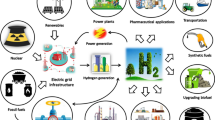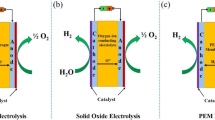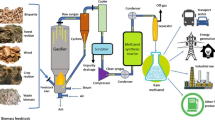Abstract
The article provides a brief overview of the prospects for the use of hydrogen energy in the world and Uzbekistan. It is shown that hydrogen is a universal source of energy and in the future can become a transitional energy resource, with a complete transition from traditional to renewable energy sources, and the displacement of hydrocarbons as energy sources.The main advantages and disadvantages of hydrogen production technologies have been considered. Information on the cost of hydrogen production from natural gas was given, taking into account the costs of capturing, storing, and utilizing carbon dioxide. Considering that the main direction of energy development in the world and in Uzbekistan is determined by the joint use of renewable and nuclear energy sources, the prospects of hydrogen production by the electrolysis of water, using electricity generated by renewable energy sources and nuclear power plants, have been shown. In order to ensure the production of hydrogen in a carbon-free way, it has been shown that in the future, in none of the scenarios of the growth of the world demand for hydrogen fuel, natural gas and coal are considered as the main raw materials for the production of hydrogen.







Similar content being viewed by others
REFERENCES
Hydrogen Economy. https://en.wikipedia.org/wiki/Hydrogen_economy.
Global Action Agenda Progress Report. The Hydrogen Energy Ministerial 2020 On-line Special Event, 2020. www.meti.go.jp/press/2020/10/20201015002/ 20201015002- 1.pdf.
Grib, N., Hydrogen energy: Myths and reality. http://www.ngv.ru/magazines/article/vodorodnaya-energetika-mify-i-realnost/.
Prospects for the development of hydrogen energy were considered by the experts of the working group at the Chamber of Commerce and Industry of the Russian Federation. https://tpprf.ru/ru/mobile/news/323884/. Accessed September 2, 2019.
Uzbekistan will switch to hydrogen energy. https://energobelarus.by/news/V_mire/uzbekistan_pereydet_na_ vodorodnuyu_energetiku/. Accessed July 28, 2011.
In Uzbekistan, 90% of electricity is produced by gas and coal. Such a poor indicator remained only in a few countries. https://kun.uz/ru/news/v-uzbekistane-90-elektroenergii-proizvoditsya-za-schyot-gaza-i-uglya-takoy-ploxoy-pokazatel-ostalsya-tolko-v-schitannyx-stranax-spetsialist. Accessed August 29, 2020.
Velesyuk, A., Hydrogen energy is the trend of the 21st century. https://atomicexpert.com/hydrogen_energy.
Naterer, G.F., Dincer, I., and Zamfirescu, C., Hydrogen Production from Nuclear Energy, London: Springer, 2013.
International Renewable Energy Agency (IRENA), Hydrogen from renewable power. Technology outlook for the energy transition. 2018. www.irena.org.
Novikov, V., What place will hydrogen take in alternative energy in Uzbekistan? https://nuz.uz/nauka-i-tehnika/1187128-kakoe-mesto-zajmet-vodorod-v-alternativnoj-energetike-uzbekistana.html. Accessed February 3, 2021.
Prospects for the development of hydrogen energy, the most advanced hydrogen technologies. https://building-tech.org/perspektivy-razvitiya-vodorodnoj-energetiki-samye-prodvinutye-vodorodnye-tehnologii/. Accessed February 8, 2020.
Mel’nikov, Yu. and Chugunov, D., Hydrogen economy: will the new fuel destroy the “fossil” civilization. https://www.forbes.ru/biznes/358673-vodorodnaya-ekonomika-razrushit-li-novoe-toplivo-iskopaemuyu-civilizaciyu. Accessed March 16, 2018.
Hydrogen energy is the trend of the 21st century. http://atomicexpert.
World energy of the future: Hydrogen, smart grids and energy efficient buildings. https://eenergy.media/ 2020/02/06/mirovaya-energetika-budushhego-vodorod-umnye-seti-i-enegoeffektivnye-zdaniya/.
Polyakova, T.V., Status and prospects for the development of hydrogen energy, Vestn. MGIMO Univ., 2012, pp. 156–164.
Hydrogen will react. https://www.gudok.ru/newspaper/?ID=1476515.
Wenzel, F.-T., Hydrogen around the world. https://www.newenergy.info/knowledge/technology/hydrogen-around-the-world. Accessed August 24, 2020.
A hydrogen strategy for a climate-neutral Europe. https://www.h2greentech.eu/a-hydrogen-strategy-for-a-climate-neutral-europe/. Accessed January 8, 2021.
Mastepanov, A., Hydrogen energy in Russia: status and prospects, https://energypolicy.ru. Accessed December 23, 2020.
The covid-19 crisis and clean energy progress. Part of tracking clean energy progress, IEA Report, 2020.
Will China do for hydrogen what it did for solar power? https://www.power-technology.com/features/will-china-do-for-hydrogen-what-it-did-for-solar-power/. Accessed January 11, 2021.
Kopteva, A., Kalimullin, L., Tcvetkov, P., and Soares, A., Prospects and obstacles for green hydrogen production in Russia, Energies, 2021, vol. 14, p. 718. https://doi.org/10.3390/en14030718
Lambert, M., EU Hydrogen Strategy, a Case for Urgent Action Towards Implementation, Oxford: Oxford Inst. for Energy Studies, 2020. https://www.oxfordenergy.org/wpcms/wp-content/uploads/2020/07/EU-Hydrogen-Strategy.pdf.
Japan intends to increase the use of hydrogen in the energy sector to 10 million tons by 2030. https://energobelarus.by/news/V_mire/yaponiya_namerena_k_2030_ godu_narastit_ispolzovanie_vodoroda_v_energetike_ do_10_mln_t/. Accessed December 11, 2020.
Hydrogen: the new bright future of energy? https://ecosphere.press/2020/11/19/vodorod-novoe-svetloe-budushhee-energetiki/. Accessed November 19, 2020.
Kramer, D., Could hydrogen bail out nuclear power? As nuclear-powered water electrolysis becomes cheaper, it could compete with the current, carbon-intensive hydrogen production process, Phys. Today, 2020, vol. 73, no. 8, p. 20. https://doi.org/10.1063/PT.3.4543
Postanovlenie Prezidenta Respubliki Uzbekistan “O merakh po razvitiyu vozobnovlyaemoi i vodorodnoi energetiki v Respublike Uzbekistan” N PP-5063 ot 9 aprelya 2021 goda (Decree of the President of the Republic of Uzbekistan “On Measures to Develop Renewable and Hydrogen Energy in the Republic of Uzbekistan” no. PP-5063 of April 9, 2021), Tashkent, 2021.
Uzbekistan will switch to hydrogen energy. https://energobelarus.by/news/V_mire/uzbekistan_pereydet_ na_vodorodnuyu_energetiku/. Accessed July 28, 2011.
Allaev, K.R., Sovremennaya energetika i perspektivy ee razvitiya (Modern Energy and Prospects for Its Development), Salimov, A.U., Ed., Tashkent, 2021.
In Uzbekistan, 90% of electricity is produced by gas and coal. Such a poor indicator remained only in a few countries. https://kun.uz/ru/news/v-uzbekistane-90-elektroenergii-proizvoditsya-za-schyot-gaza-i-uglya-takoy-ploxoy-pokazatel-ostalsya-tolko-v-schitannyx-stranax-spetsialist. Accessed August 29. 2020.
Chatzimarkakis, J., Levoyannis, C., van Wijk, A., and Wouters, F., Hydrogen ACT. Towards the Creation of the European Hydrogen Economy, Hydrogen Europe, 2021. https://www.hydrogeneurope.eu/wp-content/uploads/ 2021/04/2021.04_HE_Hydrogen-Act_Final.pdf.
Kontseptsiya razvitiya vodorodnoi energetiki Rossii. Rasporyazheniya Pravitel’stva RF ot 05.08.2021 N 2162-r “Ob utverzhdenii Kontseptsii razvitiya vodorodnoi energetiki v Rossiiskoi Federatsii” (The Concept of the Development of Hydrogen Energy in Russia. Decree of the Government of the Russian Federation no. 2162-r of August 5, 2021 “On Approval of the Concept for the Development of Hydrogen Energy in the Russian Federation”), Moscow, 2021.
Communication from the Commission to the European Parliament, the Council, the European Economic and Social Committee and the Committee of the Regions. A Hydrogen Strategy for a Climate-Neutral Europe, Brussels: European Commission, 2020. https:// ec.europa.eu/energy/sites/ener/files/hydro-gen_strategy.pdf.
Hydrogen development strategies: a global perspective. www.bruegel.org/2021/08/hydrogen-development-strategies-a-global-perspective/. Accessed August 30, 2021.
Hydrogen Strategy for Canada. Seizing the Opportunities for Hydrogen. A Call to Action. Draft Executive Summary, 2020. https://climatesan.org/share/Hydrogen-Strategy-for-Canada_Executive-Summary.pdf.
Author information
Authors and Affiliations
Corresponding author
Ethics declarations
The authors declare that they do not have a conflict of interest.
Additional information
Translated by S. Avodkova
About this article
Cite this article
Allaev, K.R., Avezova, N.R. Hydrogen—the Future of Power Engineering for the World and Uzbekistan. Appl. Sol. Energy 57, 575–583 (2021). https://doi.org/10.3103/S0003701X21060025
Received:
Revised:
Accepted:
Published:
Issue Date:
DOI: https://doi.org/10.3103/S0003701X21060025




